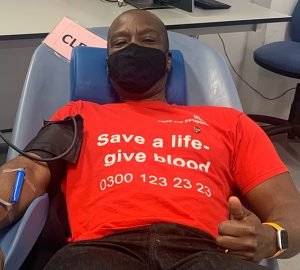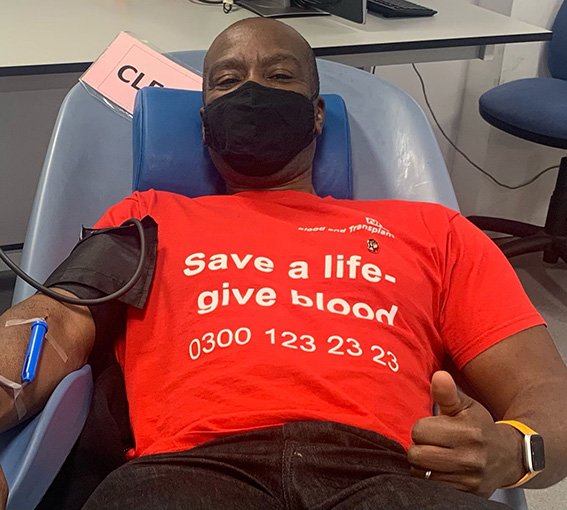Mike’s 50th Blood Donation And Still Going Strong!
 Veteran black blood donor Michael Earle, reached a huge milestone by making his 50th blood donation earlier this year. Michael has been donating his blood for well over twenty years. He continues to donate blood because he views saving lives as a very meaningful and worthwhile thing to do. There hasn’t been any other black person to reach such a milestone to our knowledge. If there are any other black blood donors to have reached such a milestone then please get in touch with us by clicking here.
Veteran black blood donor Michael Earle, reached a huge milestone by making his 50th blood donation earlier this year. Michael has been donating his blood for well over twenty years. He continues to donate blood because he views saving lives as a very meaningful and worthwhile thing to do. There hasn’t been any other black person to reach such a milestone to our knowledge. If there are any other black blood donors to have reached such a milestone then please get in touch with us by clicking here.
Born in Cardiff and currently residing in Bristol, Michael enjoys a fulfilling life working as a wellbeing coach. He is also an active advocate for Nilaari, a mental health charity. We approached Michael in July last year to produce a film about black blood donors in the UK. He was more than happy to be part of the film because he knows the percentage of black blood donors in the UK is embarrassingly low. Just 1% of UK blood donors come from Asian, African or Caribbean origin.
Sickle Cell Anaemia Within The Black & Asian Communities
According to the NHS, over 15,000 people suffer from sickle cell anaemia throughout Britain and this figure is constantly increasing. Sickle cell is a disease inherited from birth and affects mainly people from African, Caribbean and Asian backgrounds. In the last year, around 150 babies were born with sickle cell in the UK alone and even more would have inherited the sickle cell trait. Studies as to why people are born with the trait and how to treat it, requires constant research.
 Many sickle cell anemia patients have it so severe that they suffer from periodic episodes of extreme pain. This is known as a sickle cell crisis. This happens when sickle shaped red blood cells block the blood flow through tiny blood vessels and the pain can last from a few hours to a few days. If the sickle (crescent shaped) cells pool in the spleen, it can be life threatening if not treated properly.
Many sickle cell anemia patients have it so severe that they suffer from periodic episodes of extreme pain. This is known as a sickle cell crisis. This happens when sickle shaped red blood cells block the blood flow through tiny blood vessels and the pain can last from a few hours to a few days. If the sickle (crescent shaped) cells pool in the spleen, it can be life threatening if not treated properly.
Treatment involves the patient to require a blood transfusion, or an exchange of several pints of blood. In severe cases, regular blood exchanges are needed in order to stay alive or live a pain free life. Seeing as it’s mainly black and Asian families that are directly affected by sickle cell, the patient can only use matched blood. Obviously, blood from these ethnic community groups are the only types which are suitable for victims of sickle cell crisis and black blood heroes such as Michael are desperately needed.
Donating Blood To Save Lives
Unfortunately there isn’t anywhere near enough people from certain ethnic backgrounds stepping forward to donate blood. 4,000 pints of red blood cells are required every month for sickle cell sufferers in England alone. If you then look at all the other reasons where blood transfusions are needed such as accidents, emergencies or cancer to give a few examples you can then imagine the scale of issues a lack of Black & Asian blood donors create. The more regular blood donors the better because we can get on with saving more lives. Too many sickle cell patients suffer due to a lack of suitable blood for a blood exchange or a blood transfusion.
Every drop of blood donated to UK hospitals are used to save lives so it is very important that blood supplies are always available when needed. This is why NHS blood services throughout the UK are constantly reminding us that blood donors are in desperate need. Simply put, people will die if blood stocks run low and the only way to keep the stocks up is by donating. Although 4000 pints is a pretty high number, this level can be met. We need another 16,000 heroes from ethnic backgrounds like Michael who generously do their bit to help others. Reaching a 50th blood donation is absolutely remarkable. So on behalf of Black Blood Donors UK and all sickle cell patients, Mr. Michael Earle, we all salute you!
Conclusion
Not only does donating blood save lives, but it’s also a fun thing to do. Perhaps donating blood for the very first time can sound rather daunting to some, but in all honesty once it’s done, you’ll be wondering to yourself what was the fuss all about.
- Donating blood takes less than an hour when you arrive at your appointment and the well trained staff are very helpful. They will ensure that the process runs smoothly from start to finish.
- We explain this in our short documentary on YouTube, which you can view by clicking here.
- Are you ready to do something extremely positive and save lives? Become a blood donor by registering here.


